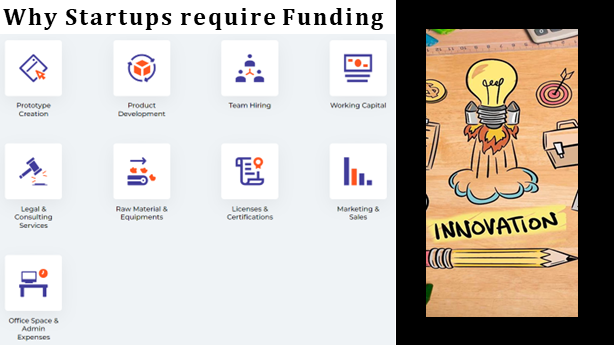
In the exhilarating world of entrepreneurship, where dreams are transformed into reality and innovations shape the future, one crucial aspect stands out as the lifeblood of every aspiring venture: FUNDING. For startups navigating the tumultuous seas of business, securing adequate funding is not just a milestone; it’s a make-or-break endeavor that can determine the trajectory of their success. In this series of nine articles, Small Enterprise India embarks on a journey through the intricacies of the funding landscape, guided by the expertise of Dr. Abdul Razak MBA, Ph.D, PDF, a distinguished professor at the EDII Ahmedabad (Entrepreneurship Development Institute of India, Ahmedabad).
At the forefront of innovation and entrepreneurship, Dr. Razak’s insights have become a beacon of light for countless aspiring entrepreneurs seeking to navigate the labyrinth of funding options. His recent presentation on this very topic during the ThriveNation roadshow sparked fervent discussions among startups, igniting a demand for deeper insights and actionable strategies to navigate the funding landscape effectively.
In response to this overwhelming demand and with the collective aspiration to empower every budding entrepreneur, we present a comprehensive exploration of funding strategies for startup success. From deciphering the nuances of different funding avenues to unraveling the secrets of crafting a compelling pitch, each article in this series is meticulously crafted to equip you with the knowledge and tools needed to embark on your funding journey with confidence and clarity.
Join us as we delve into the heart of startup funding, unraveling its mysteries, and illuminating the path toward entrepreneurial success. Whether you’re a seasoned entrepreneur seeking to scale new heights or a budding visionary with a world-changing idea, this series is your definitive guide to mastering the art of navigating the funding landscape and turning your dreams into reality.
1. Importance of Funding for Startups

Funding serves as the lifeblood of startups, fueling their development, expansion, and day-to-day operations. Its significance cannot be overstated, as it enables startups to:
a) Drive Innovation and Product Development: With adequate funding, startups can invest in research, development, and innovation, turning ideas into tangible products or services that meet market demands.
b) Support Marketing and Market Expansion: Marketing is essential for gaining traction and expanding market reach. Funding provides startups with the resources needed to execute effective marketing campaigns and penetrate new markets.
c) Provide a Financial Cushion for Unforeseen Challenges: The startup journey is rife with uncertainties and challenges. Having sufficient funding acts as a buffer, allowing startups to navigate unexpected hurdles without jeopardizing their operations or growth trajectory.
The Funding Landscape: The funding landscape for startups is diverse, offering a plethora of options tailored to different stages and needs. From bootstrapping and angel investment to venture capital and crowdfunding, each avenue comes with its own set of opportunities and challenges. Understanding the nuances of each funding source is crucial for making informed decisions that align with the startup’s goals and growth trajectory.
Strategic Decision-Making: Crafting a funding strategy is a strategic endeavor that requires careful consideration of various factors, including the startup’s stage of growth, market dynamics, competitive landscape, and long-term objectives. A well-defined funding strategy serves as a roadmap, guiding startups through the complexities of the funding journey and positioning them for sustainable growth and success.
Founder Funding vs. External Funding: Startups often grapple with the decision of whether to rely on founder funding or seek external investment. While founder funding offers autonomy and avoids equity dilution, external funding can provide access to larger capital pools and valuable expertise. As startups evolve and scale, many opt for a hybrid approach, leveraging both founder funding and external investment to fuel their growth.
Virtual Guide to Startup Funding: As you embark on your startup journey, this guide serves as your virtual companion, equipping you with the knowledge and tools needed to navigate the intricacies of startup funding. From understanding the fundamentals of funding to exploring advanced strategies for raising capital, let this guide be your compass as you chart a course towards startup success.
Funding is not merely a means to an end for startups; it is the cornerstone upon which their success and growth are built. By understanding the importance of funding, navigating the funding landscape strategically, and making informed decisions at every step of the journey, startups can position themselves for sustainable growth, innovation, and prosperity in an ever-evolving business landscape.
Why Startups Require Funding?

Startups require funding to fuel their journey from conception to growth and beyond. At their inception, startups often lack the financial resources needed to turn ideas into viable products or services. Funding serves as the catalyst for innovation, enabling startups to invest in research, development, and prototyping. Without adequate funding, startups may struggle to bring their visions to life, hindering their ability to compete in the market and fulfill unmet needs.
Moreover, funding is essential for scaling operations and expanding market reach. As startups gain traction and attract customers, they need to invest in marketing, sales, and infrastructure to sustain growth. This requires capital to hire talent, acquire resources, and execute strategic initiatives. Additionally, funding provides startups with the financial cushion needed to navigate unforeseen challenges and market fluctuations, ensuring their resilience in the face of adversity.
Furthermore, startups require funding to attract top talent and build a skilled team capable of executing their vision. Competitive salaries, employee benefits, and equity incentives are essential for attracting and retaining talent in a competitive market. Ultimately, funding is the lifeblood of startups, empowering them to innovate, grow, and thrive in an increasingly dynamic and competitive business landscape.
Types of Startup Funding
Startup ventures are the backbone of innovation, but their success often hinges on securing adequate funding. Understanding the various types of funding available is crucial for entrepreneurs seeking to turn their ideas into reality. Among the primary funding options are Equity Financing, Debt Financing, and Grants, each with its unique characteristics, risks, and sources.
- Equity Financing:
Equity financing involves selling a portion of the company’s ownership in exchange for capital. Unlike debt financing, there is no obligation to repay the invested funds. Instead, investors become shareholders and share in the company’s success through capital growth. However, startups relinquish partial ownership and often grant equity investors a say in decision-making processes. Common sources of equity financing include Angel Investors, Venture Capitalists, Crowdfunding platforms, and Incubators/Accelerators.
- Debt Financing:
In debt financing, startups borrow money with the obligation to repay the principal amount along with interest. While this option provides immediate capital without diluting ownership, it comes with the responsibility of adhering to repayment timelines. Lenders, such as banks and non-banking financial institutions, have minimal involvement in business operations and typically require collateral to mitigate risks.
- Grants:
Grants are financial awards provided to startups to facilitate specific goals or incentivize performance. Unlike equity and debt financing, grants do not require repayment, making them an attractive option for startups with limited resources. However, grants often come with strict eligibility criteria and may be contingent on meeting predetermined milestones. Sources of grants include government agencies at the central and state levels, corporate challenges, and grant programs offered by private entities.
Startups have a plethora of funding options to fuel their growth journey. Whether through equity financing, debt financing, or grants, each avenue offers unique advantages and considerations. By understanding the nature, risks, and sources associated with each type of funding, entrepreneurs can make informed decisions aligned with their business objectives and pave the way for sustainable growth and success.
Author : Dr. Abdul Razak, EDII, Ahmedabad.

